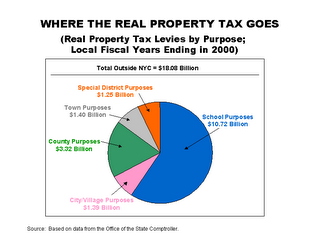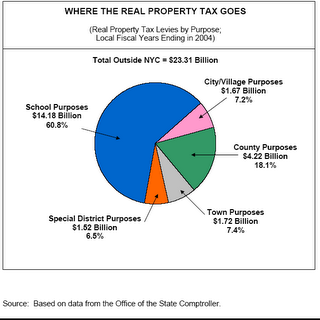Can't you smell that smell
 Let’s face it. There’s a rotten smell wafting across Albany, and it ain’t the stinkin' landfill. Local and state politicians seem a bit too anxious to reassess the ground their standing on. Perhaps that's because its true value isn’t half what the real estate agent will eventually list it for. Or maybe it’s because every time they boost property values, it inflates this false economy that’s netting them beaucoup bucks.
Let’s face it. There’s a rotten smell wafting across Albany, and it ain’t the stinkin' landfill. Local and state politicians seem a bit too anxious to reassess the ground their standing on. Perhaps that's because its true value isn’t half what the real estate agent will eventually list it for. Or maybe it’s because every time they boost property values, it inflates this false economy that’s netting them beaucoup bucks.Talking about assessments isn’t a pleasant task; it’s really quite boring. So boring, in fact, nobody really wants to discuss the remarkably convoluted scam that continues to proliferate at the state Office of Real Property Services.
In a rather large nutshell, the state has come down hard on the counties to ensure that all of their property is listed at so-called “fair market value.” If the state real property officials review their market data –numbers that could very easily be pulled out of thin air –and decide a given municipality is off kilter, they can lower the “equalization rate.”
Once a municipality’s equalization rate is dropped, the county is given the green light to offset the proportion of state aid. The lower the equalization, the greater the portion of school taxes landowners pay for each $1,000 of assessed value on their property. This is a situation that largely benefits those who either don't sell or drastically improved their properties over a long span of time. And for the most part, these are low- and fixed-income property owners who have no intention of either moving or putting a $50,000 addition on their homes.
 So what’s in reassessing that benefits the state? Simple: to increase income tax revenues. See, low income people pay a paltry sum of income taxes in comparisson to the rest of the public. Poor people with property pay just as few taxes if their living off a property they bought for $20,000 in 1990. This is a situation that stymies every ounce of government from local supervisors to state senators. Less tax dollars mean less money to play with. And if said government official is at the top of the state legislature, this means less money for pork barrel projects, which win them votes.
So what’s in reassessing that benefits the state? Simple: to increase income tax revenues. See, low income people pay a paltry sum of income taxes in comparisson to the rest of the public. Poor people with property pay just as few taxes if their living off a property they bought for $20,000 in 1990. This is a situation that stymies every ounce of government from local supervisors to state senators. Less tax dollars mean less money to play with. And if said government official is at the top of the state legislature, this means less money for pork barrel projects, which win them votes.Now, if the assessing department –egged on by both the state, county and local government –rolls by and quadruples the value of grandma’s two-bedroom ranch on an acre of rural land, she’ll likely have to either move to one of upstate New York’s flailing cities, where property values are generally lower, or move out of the state all together. Either way, her property will be marketed by a real estate agent for anywhere from $20,000 to $50,000 over what's loggd as the assessed value. The agent will then generally settle for between $10,000 and $15,000 beneath what's listed as the price. Once the sale is made, the trusty assessor can swing by and up the value again by whatever was reported as the price, perhaps even more depending on who’s moving in.
Bottom line, the person who purchased grandma’s land will need to be of an income level to pay the local taxes. That income level is guaranteed to be far greater than what the old bag was netting even before all of her greedy little senior and low-income exemptions.
The new owner becomes New York’s cash cow, upping the ante for the state general fund through whatever is paid in income taxes. And with increases to what’s frequently referred to as a cost-of-living, that property owner will start buggering his or her boss for a raise and thereby add even more shillings to the tax pile.
What’s even better is if grandma moves into a rented apartment in the inner city belonging to a wealthy real estate magnate, perhaps even the same one who bought her property and cut it up into eight bite-sized parcels in order to build a development of eight houses, thereby allowing eight new higher-level incomes to sprout up amid the Legislature’s cash crop.
 Plain and simple, real property services is a capitalist-driven scam that’s making a few people very rich and a few others very powerful. But for the rest of the state, it's the proverbial middle finger.
Plain and simple, real property services is a capitalist-driven scam that’s making a few people very rich and a few others very powerful. But for the rest of the state, it's the proverbial middle finger.


2 Comments:
Mr. Alger,
First off, don't be RIDICULOUS! People have been watching their rising property values "ride" for years here, and there isn't a damn thing we can see that will stop that from continuing. It is a proven fact that Saratoga is a coveted place to live, and with that goes increasing property values. So toothless Joe has to move out of his pink painted shanty on the West Side? Big deal? We have a prefab home ready to go, and this time we aren't doing any demo; we're just going to drop that sucker whether he's home or not. In Saratoga we don't have the convenience of faulty dykes that can simply flush away our problems; But we can tell you that your bungalow is worth a lot more money. And good luck selling it, because trust me...nobody wants to buy your newly revalued piece of shit.
So a one bedroom apartment now rents for $1000 a month? Suck it up and deal, peon.
One honest "assessment" deserves another,
Yours truly,
The good folks at Roohan Realty
Geraldine Abrams
Your Landlord
The Department of Public Works
Please. Assessments have little to do with property taxes -- they're merely a way to assign proportionate responsibilities. The real villains here are the people who set the budget -- they figure out how much to spend and how much revenue they need, then rely on the property tax system to assign to property owners a tax levy. Fair assessments, based on current accurate values, make this process more equitable. If you've got a beef with how much tax you're paying, complain to the state that's cramming more and more costs down the throats of localities and on the city council that's spending our money on stupid ideas like "affordable" housing designed for people who make $65,000 a year.
Post a Comment
<< Home